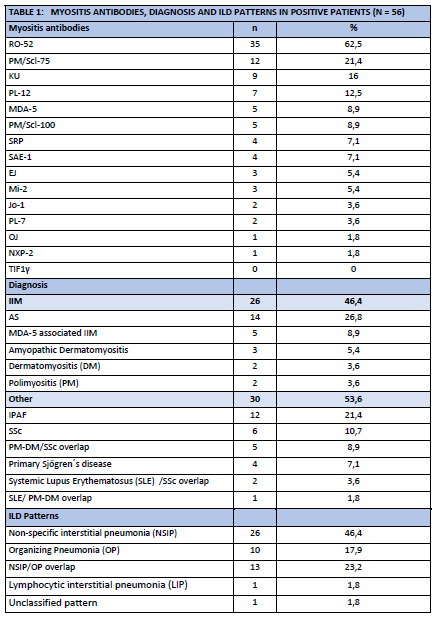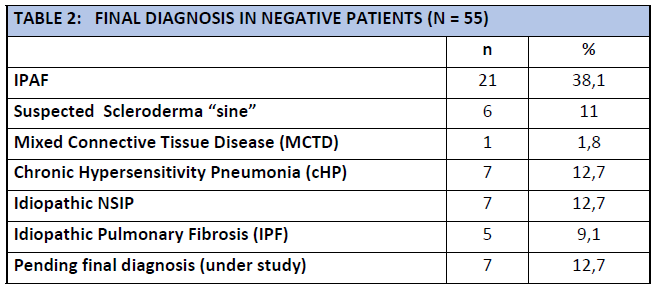Session Information
Date: Monday, October 22, 2018
Session Type: ACR Poster Session B
Session Time: 9:00AM-11:00AM
Background/Purpose: Interstitial Lung Disease (ILD) is a common manifestation of Connective Tissue Diseases (CTD), mainly Systemic sclerosis (SSc), Rheumatoid Arthritis and Idiopathic Inflammatory Myositis (IIM) spectrum diseases. New myositis specific (MSA) and associated (MAA) antibodies have shown to be useful in identifying underlying CTD in patients with ILD of unknown etiology. They have helped identifying diagnosis such as Anti-synthetase Syndrome (AS), MDA-5 associated IIM, overlap syndromes (OS) and Interstitial lung disease with autoimmune features (IPAF). Our purpose is to evaluate the diagnostic utility of the determination of MSA/MAA in a group of patients with ILD of unknown etiology and clinical features suggestive of underlying CTD.
Methods: It is a descriptive study. Between January 2017 and March 2018, a commercially available myositis panel (16 antibodies, Immunoblot technique) was performed in 111 patients from a rheumato-pneumological clinic in the Instituto Nacional del Tórax in Santiago, Chile. All patients had confirmed ILD by high resolution chest tomography (HRCT) and clinical features suggestive of underlying CTD.
Results: Among 111 patients, 76 (72%) were female, and the average age was 51,5 +/- 12,9 y/o. All patients had confirmed ILD by high resolution chest tomography (HRCT). There were 56 (50,5%) positive patients for one or more antibodies of the panel; and 55 patients (49,5 %) were negative. Antibodies against Ro-52 were the most frequent (n= 35, 62,5 %), followed by PM/Scl-75 (n= 12, 21,4%); Ku (n=9, 16%) and PL-12 (n=7, 12,5%). AS was the most common final diagnosis (14 patients). Antibodies, final diagnosis and ILD patterns of the positive patients are detailed in Table 1. Final diagnosis of the 55 negative patients are detailed in Table 2.
Conclusion: Myositis antibodies are useful in the study of patients with ILD of unknown etiology and clinical features suggestive of an underlying CTD. They can help establish a definite rheumatological diagnosis, and therefore offer the patient a proper treatment. We highlight the importance of Idiopathic inflammatory myopathies in this group of patients, mainly AS and MDA-5 myopathy. Our cohort shows low rate of Jo-1 because this antibody is widely available in our country, and we didn´t perform the myositis panel in patients who had previously positive Jo-1. Finally, we highlight the contribution of MSA/MAA in detecting IPAF patients.
To cite this abstract in AMA style:
Wolff V, Maya J, Cuéllar C, Florenzano M, Peralta A, Balboa V. Diagnostic Utility of Myositis Antibodies in Patients with Interstitial Lung Disease and Suspected Underlying Connective Tissue Disease [abstract]. Arthritis Rheumatol. 2018; 70 (suppl 9). https://acrabstracts.org/abstract/diagnostic-utility-of-myositis-antibodies-in-patients-with-interstitial-lung-disease-and-suspected-underlying-connective-tissue-disease/. Accessed .« Back to 2018 ACR/ARHP Annual Meeting
ACR Meeting Abstracts - https://acrabstracts.org/abstract/diagnostic-utility-of-myositis-antibodies-in-patients-with-interstitial-lung-disease-and-suspected-underlying-connective-tissue-disease/


